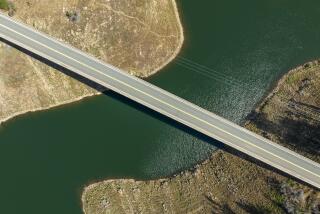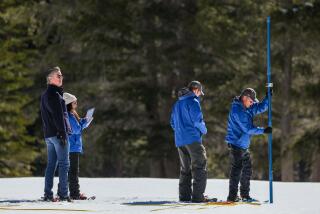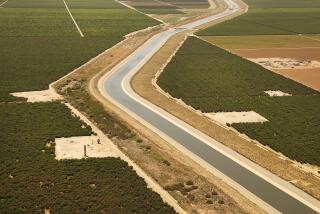Schwarzenegger proclaims state of emergency because of drought
- Share via
Gov. Arnold Schwarzenegger proclaimed a statewide drought emergency Friday, urging Californians to cut water use by 20% and easing the way for water sales from Northern California to Southern California cities and San Joaquin Valley farms.
The proclamation amplifies a drought emergency that Schwarzenegger declared last year in several agricultural counties, where more than 100,000 acres of farmland have gone unplanted for lack of water.
The drought declaration stops short of mandatory water rationing. But it asks urban water users to step up conservation efforts. And it directs state agencies to cut back on landscape irrigation, including along highways.
The directive also orders the state to streamline permitting for water projects, such as recycling or desalination operations, and expedite water transfers to needy irrigation districts and urban areas in Southern California.
The governor issued the declaration even though a series of February storms have fattened the critical Sierra Nevada snowpack and pushed up reservoir levels in Northern California.
“Prepare for the worst and hope for the best,” state water resources director Lester Snow said.
Although more rain and snow is predicted in the coming week in Northern California, Snow said it is unlikely the state’s giant waterworks will return to normal levels this spring.
In a statement, Schwarzenegger called the state’s water situation “a crisis, just as severe as an earthquake or raging wildfire.”
The governor and Republicans in the Legislature have for several years pushed unsuccessfully for bonds to build new reservoirs. Some are calling for construction of a canal to divert water around the troubled Sacramento-San Joaquin delta.
Proponents of such projects seized on Friday’s drought declaration to bolster support for a fresh round of bond proposals.
“I applaud the governor’s action today,” Sen. Tom Harman (R-Huntington Beach) said. “This emergency underscores, once again, the seriousness of our state’s water crisis. I hope that this declaration will spur immediate action in the Legislature to address water storage, conveyance and protection of the delta.”
Farmers in the San Joaquin Valley and regional water agencies in Southern California are expected to buy a substantial amount of water from Sacramento Valley irrigation districts through a drought water bank.
But Snow said the transfers would make up for only a part of the delivery cutbacks that may occur this year.
Officials with the State Water Project, which sends Northern California water to the Southland, have said they may be able to provide only 15% of full allocations. And federal water managers recently warned they may not deliver any water to some big farms in the Central Valley.
Recent storms could brighten that picture, but Snow said he did not expect state and federal water deliveries to increase significantly.
Agricultural officials have predicted heavy job losses in Central Valley farm communities and warned that the economic toll of the drought could climb into the billions of dollars this year.
This is the third year of below-average precipitation and snowpack in California. The situation has been compounded by court-ordered pumping cutbacks in the Sacramento-San Joaquin delta to protect crashing fish populations.
Los Angeles Mayor Antonio Villaraigosa has called for price increases and restrictions on outdoor watering to ease high summer demand. The Metropolitan Water District of Southern California, the region’s major water wholesaler, has said there is a good chance it will have to cut deliveries to local water agencies.
--
Times staff writer Patrick McGreevy contributed to this report.
More to Read
Sign up for Essential California
The most important California stories and recommendations in your inbox every morning.
You may occasionally receive promotional content from the Los Angeles Times.











